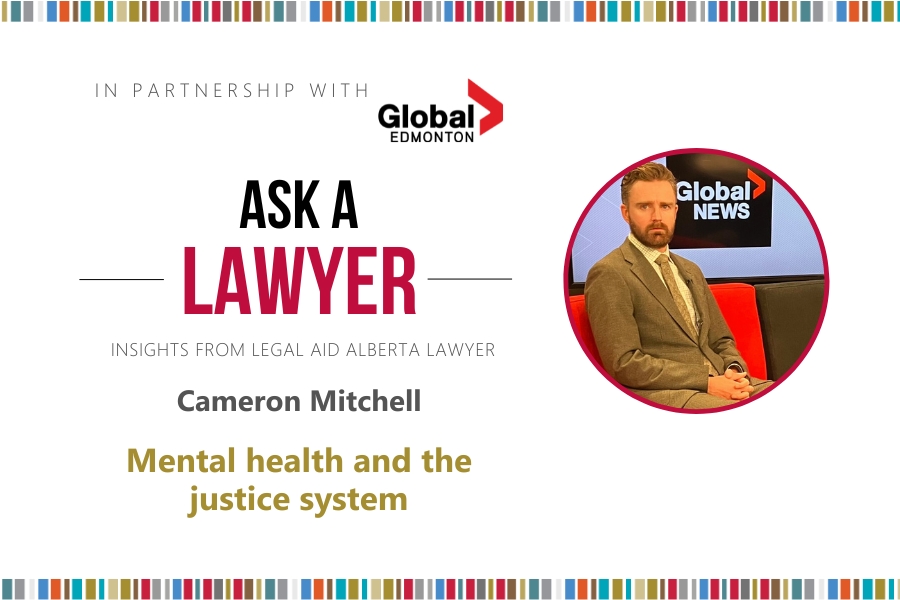Mental Health Week is May 5 – 11, raising awareness of the fact that many people – regardless of demographics – struggle with different forms of mental health issues throughout their lives.
Legal Aid Alberta staff and roster lawyers practicing all areas of law come into contact with individuals affected by mental health issues. This week, LAA staff duty counsel Cameron Mitchell appeared on the Global Edmonton Morning News to shed light on Mental Health Court and the ways it helps address these issues where criminal charges are involved.
View the segment (Full transcript below).
Transcript
Vinesh Pratap: May 5 to 11 is Mental Health Week and there are times when mental health and our criminal justice system overlap. Legal Aid Alberta staff duty counsel lawyer Cameron Mitchell is here today to talk to us about what happens when the two intersect. Cameron, thank you so much for being here.
Cameron Mitchell: Oh, wonderful to be here.
Pratap: This is a very, very important topic. So take us through your role as duty counsel – how does mental health enter into the day-to-day of your job?
Mitchell: So, what I am is a criminal defence lawyer and I work for our duty counsel unit at Legal Aid Alberta. So, duty counsel, we’re kind of like the lawyers for the lawyerless. So if somebody doesn’t have a lawyer early on, then I’m one of the people that helps them. So it could be somebody in custody, maybe something like help them out with bail, maybe it’s somebody out of custody who shows up to court a little confused I can help with corresponding with the Crown and resolving some files.
But you know unfortunately, as duty counsel, a lot of the people that I deal with that are charged with crimes also suffer from different types of mental health issues.
Now, in Edmonton we have a program that’s dedicated to those types of cases, and it’s called Mental Health Court and it’s one of the courtrooms that I am regularly in.
Pratap: OK, so, take us through – first of all, how long has Mental Health Court been around and then how does it work. I mean obviously it is not an automatic in.
Mitchell: Oh yeah, so Mental Health Court is still relatively new, it started back in 2018, and it is geared towards trying to solve the issue of the over representation of people with mental health issues that end up charged with crimes.
So if you go into Mental Health Court in lots of ways it still looks like a regular court room. You’ve still got your judge, you’re still got your defence counsel. But there is also a lot of other players. You’re going to see somebody there from Alberta Health Services, and they can help you out with the accessing an accused’s previous mental health history, you’re going to have a justice navigator in there and – they’re awesome – they can do things for the accused like maybe get set up with housing, maybe get set up with some type of income support, and you’re also going to have a psychiatrist in there who can help out with things like mental health assessments.
But Mental Health Court is a collaborative court room and we all work together to try to come up with a solution, to try and come up with a plan for the people in there so that when they walk out of there they’ve got a plan, they know what to do so they will not get charged again.
Pratap: How does an individual end up in the court because they initially enter through the system and I’m sure there are checks and balances in place, right?
Mitchell: Yeah, and there is a form that needs to be filled out but what you are basically looking at is there must be some sort of previous mental health diagnosis. So that could be something like schizophrenia, FASD (Fetal Alcohol Syndrome Disorder), maybe it’s something like brain damage.
But those people can apply to get into Mental Health Court for two different things: One of them is for bail and the other is for guilty plea and resolution. But ultimately, if you walk into Mental Health Court, you’re probably walking out on conditions. And those conditions are part of this overall plan.
So, frequent conditions that we do see are things like figure out who the doctor or psychiatrist is that the person has to see and make sure they see them regularly, figure out the correct type of medication they need to be on to be able to address that underlying issue, or sometimes the mental health issues are related to some type of addictions and treatment.
But ultimately those conditions are geared towards getting them the help they need so again, hopefully, they don’t get charged again.
Pratap: You know, as we were talking during the break, this is a very complicated issue. What else are you learning? What is the evolution of mental health and the intersection of the criminal justice system – how is that changing?
Mitchell: So I really do think that there’s a big shift sort of in our approach to mental health and the criminal justice system in particular, and sort of that old way of kind of locking people up and putting them in jail doesn’t really work when there are mental health issues. So, trying to treat those mental health issues off the bat so that they’re not charged again and again and there is a lot going on underneath, in the community.
I have a colleague, Amna Quershi, she teaches a course called Mental Health and the Law at the University of Alberta. But there’s a lot of people doing a lot of great work to address this really complex issue in mental health and the law.
Pratap: All right well thank you Cameron for coming in, for shining some light on this very complex issue, it’s greatly appreciated.
Mitchell: Yeah – thanks for having me.
Pratap: And Legal Aid Alberta lawyers, they specialize in family law, child welfare, domestic violence, immigration and youth and adult criminal defence. And if you have a question for a lawyer you can send it to [email protected].


